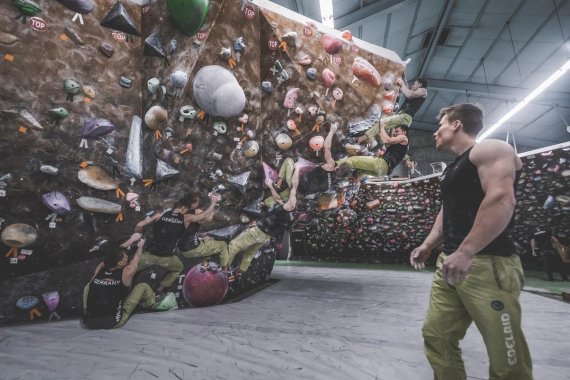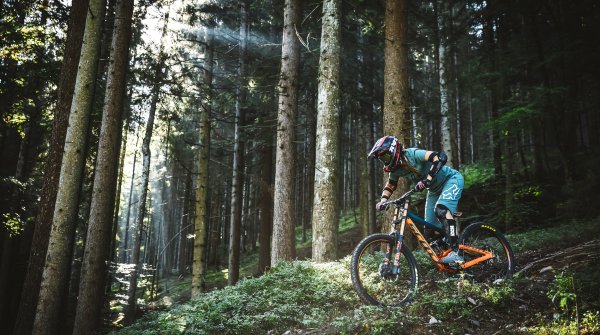
“We have great potential to become something like beach volleyball,” says Olaf Tabor, CEO of the German Alpine Club at the beginning of the federation’s own Olympic campaign “Climb to Tokyo” in Munich. The numbers also prove that the sport has public appeal at the performance level. At the Boulder World Cup in Munich in summer 2017, 12,000 people cheered for the climbing stars. “Climbing will be the only vertical sport at the summer Olympics,” Tabor continues, “and it is going provide some spectacular sights as a highly active sport.”
“Climbing is going Olympic” – a headline that seriously divided the climbing scene even back in August 2016. Critics feared a further commercialization of the sport and doubted that the existing structures would allow the promotion of the elite sport. Germany’s climbers, who are part of the prospective squad for the 2020 Olympics, still don’t even have their own training walls.
The 17 young men and women of the German national squad are training in commercial climbing halls that are actually intended for the general public. “We want to change that as quickly as possible so we can have better conditions for the 2019 qualifying events,” says Urs Stöcker. The former coach for the Swiss national team has been one of three national coaches responsible for getting the German squad fit for the Olympics since 2017. A Bavarian national performance center was opened in Augsburg in late April.
40 Years After Messner's Wild Solo Ride: The World's Best Climbers
Another source of skepticism was the format in which the competition will be broadcast: Olympic Combined. A three-way fight comprised of the three disciplines of speed, bouldering, and lead already established in the competition. A compromise, as the IOC only wants to award a maximum of six climbing medals: one gold, silver, and bronze for the men’s and women’s competitions. The overall rating will be calculated by multiplying the results in the individual disciplines. The lower the total, the better the placing. “Bouldering is our strongest discipline,” says Urs Stöcker. The Germans are also strong in lead, i.e. high climbing on a rope.
The third discipline, speed climbing, is the only one not enjoying the biggest popularity. As the name would imply, it’s all about speed. On a wall standardized in inclination, height (15 meters), and grip sequence, the athletes move upwards at top speeds. The current world record is 5.46 seconds; the German record by Jan Hojer is at 7.29 seconds. “We’re striving for an average time in the six-second range,” says Stöcker. That could be enough to reach a good placement.
“The aspiration is to send complete climbers to Tokyo,” says Stöcker, who comes from the mountaineering world himself. You can only reach the top of the world if you also deal with your weaknesses and overcome resistance. In any case, the training will be even more extensive, because the disciplines differ greatly in their requirements. By now, even Adam Ondra has confirmed his participation. The climbing star had previously been a strong critic of the format. In general, the mood has changed: Despite the unusual format, the competitive scene no longer takes quite a critical view of the Olympics.
“The Olympics need climbing more than climbing needs the Olympics,” says Wolfgang Wabel, Mountain Sports division manager, emphasizing Germany’s Olympic ambitions. As a fresh, young sport, climbing could mean a boost in image for the Olympics. This self-awareness is also reflected in the goal of qualifying two men and one woman for the Olympic debut in Japan in 2020. Germany ranks among the top five nations in climbing, along with France, Austria, the US, and Slovenia. Worldwide, 20 men and 20 woman can qualify for the Olympics.
A maximum of two starters per gender and nation may compete. Jan Hojer and Alex Megos are considered the big German favorites. It’s less clear for the women, as the top is not very differentiated. Young, up-and-coming stars like Hannah Meul, Alma Bestvater, and Romy Fuchs still need to get established before they have chances at the Olympics.
In any case, Germany’s hopes for the Olympic Games still extend to the 2024 Olympics in France: The probability that climbing will also be representing in Paris is very high, according to assessments by the representatives of the German Alpine Club. Climbing is only a temporary sport at the 2020 Olympics; a decision on remaining in the Olympic program in 2024 and beyond still has yet to be made. “We don't know where we're going,” says the club’s CEO, Olaf Tabor: But that’s the nature of adventures, themselves. What’s clear: The high level is set to be maintained even after Japan. Regardless of whether climbing stays Olympic or not.
Mit der Kampagne „Flash it!“ wirbt der DAV für Kooperationspartner, die die Entwicklung des Klettersports auf Leistungsebene mitgestalten wollen. „Es ist ein Markt entstanden, den man noch explizit und exklusiv besetzen kann“, sagt Wolfgang Wabel, beim DAV für den Bereich Bergsport zuständig. Die Nachhaltigkeitsidee verpflichte den DAV aber, nach strengen Massstäben auszuwählen. „Die Automobilbranche kommt nicht infrage“, sagt Wabel. Die Kooperationsangebote reichen von der Möglichkeit, als Presenter das Thema Klettern exklusiv zu belegen, über die Zusammenarbeit mit Athleten und Nachwuchskletterern bis hin zu der Präsenz auf Events inklusive Logo-Rechten und Integration in die Olympia-Kampage des DAV – #climbtotokyo.

 Sports BusinessSki Mountaineering Goes Olympic: What Milano-Cortina 2026 Means
Sports BusinessSki Mountaineering Goes Olympic: What Milano-Cortina 2026 Means
- ISPO awards
- Mountain sports
- Bike
- Design
- Retail
- Fitness
- Health
- ISPO Job Market
- ISPO Munich
- ISPO Shanghai
- Running
- Brands
- Sustainability
- Olympia
- OutDoor
- Promotion
- Sports Business
- ISPO Textrends
- Triathlon
- Water sports
- Winter sports
- eSports
- SportsTech
- OutDoor by ISPO
- Heroes
- Transformation
- Sport Fashion
- Urban Culture
- Challenges of a CEO
- Trade fairs
- Sports
- Find the Balance
- Product reviews
- Newsletter Exclusive Area
- Magazine



![mb-170504-kaltenbrunner By ascending the K2 in 2011, Gerlinde Kaltenbrunner was the first woman ever to ascend all eight-thousanders and the first who managed this without additional oxygen. However, the 1970 born Austrian is not keen on records. " If it was all about records, I would have taken the easiest route everywhere [...] Being the first is not important to me".](/sites/default/files/styles/gallery_image_article_phone_1x/public/b/79/70/79706302-imageData.jpg?h=8fe3b20d&itok=abz5O8dZ)









![mb-170504-kaltenbrunner By ascending the K2 in 2011, Gerlinde Kaltenbrunner was the first woman ever to ascend all eight-thousanders and the first who managed this without additional oxygen. However, the 1970 born Austrian is not keen on records. " If it was all about records, I would have taken the easiest route everywhere [...] Being the first is not important to me".](/sites/default/files/styles/gallery_thumbnail_article_phone_1x/public/b/79/70/79706302-imageData.jpg?h=8fe3b20d&itok=9-Ka4q08)










